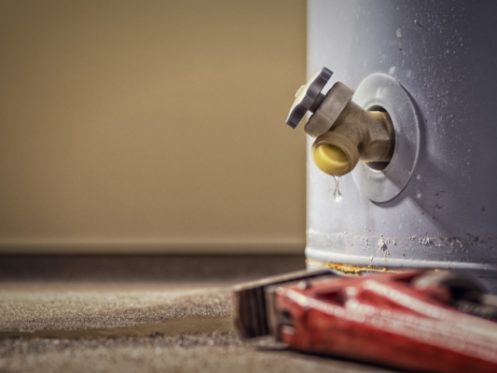Most people want to know that they’ll have enough hot water to handle cleaning and bathing when they need to. The only way to do this is to have a hot water heater that can keep up with the demand of your home, but you don’t want to end up with one that’s too big for your needs because that can waste water and power. Consider these points when you’re trying to find a new hot water heater for your home.
Types of Water Heaters
There are four primary types of water heaters to consider when you’re looking for a new option for your home. Each type has benefits and drawbacks.
Storage or tank water heaters are the most common type. These consist of an insulated tank where water is heated and stored until needed. On the downside, these can waste energy through standby heat loss because as the water cools the thermostat will trigger the heaters to turn on to keep the water at the set temperature. Heat loss can be mitigated by installing a tank insulator to hold the heat in. While these types of heaters are the least expensive to install, they do require some maintenance as the tank must be cleaned from time to time.
Tankless water heaters store water but heat it directly as it flows through the device. They are typically more energy-efficient than storage tank heaters and provide hot water on demand. However, they can’t always supply enough hot water for simultaneous, multiple uses, such as taking a shower and running the dishwasher or clothes washer at the same time, so some homeowners opt to have more than one unit installed to handle the highest demand the home will have. They usually come in both electric and gas models. They can cost a bit more as an initial investment, but because they aren’t constantly running to heat the water, they usually last longer.
Heat pump water heaters capture heat from the air or ground and transfer it to the water. They use electricity but are more energy efficient than traditional electric water heaters. They can be expensive to purchase initially, but the operating cost can be less than half of a standard electric water heater, and they last almost twice as long. Plus, they’re environmentally friendly.
Solar water heaters use energy from the sun to heat water. These heaters are very energy efficient and can provide substantial savings over time, depending on the amount of sunlight available. They usually have a higher up-front cost compared to other types, but they last a long time and are a greener choice than other types of water heaters. Plus, there are typically some tax credits available to homeowners who integrate solar power into their homes.
Hot Water Heater Fuel Sources
Another consideration for the hot water heater you choose is the type of fuel source you need, which depends largely on what’s available in your location. The two most common options in the United States are natural gas and electricity. You may also choose from propane, fuel oil, geothermal energy, or solar energy.
Typically, natural gas hot water heaters are a bit more expensive than electric models, but natural gas hot water heaters have a lower operating cost. Solar and geothermal models are considerably more expensive initially, but they are much less costly to operate than other types.
Most people want the hot water to continue if the power goes out, especially during the frigid Colorado winters. Because of this, think carefully before you pick an electric hot water heater installed unless you have a whole house generator. Fuel sources other than electricity will likely continue to operate normally during a power outage unless they’re dependent on electricity to power the thermostat or ignite the heating system.
The type of fuel source can also affect the installation process. Ensure you work with a company that has ample experience with hot water heater installation. Summit Heating & A/C offers hot water heater installation and repair for all fuel types. We also have electricians and other professionals on staff who can handle initial installations and retrofitting to change fuel sources. Being able to count on one company to handle everything takes the stress out of trying to plan the installation.
Determining the Size of the Hot Water Heater
The size of the water heater that you need depends on your household’s hot water usage, measured by what’s called the first hour rating (FHR). You also need to know the flow rate if you’re using a tankless heater. A professional can help you to determine this so that you can get the hot water heater that can meet your family’s needs.
Estimate the amount of hot water that your household uses during the busiest hour of the day, which is the peak hour demand. For example, if you have two people who take morning showers with a shower head that uses 2.5 gallons per minute, and each shower lasts about 10 minutes, that’s 50 gallons (2 people x 2.5 gallons per minute x 10 minutes) of hot water. Add the amount of water used by other appliances like dishwashers or washing machines if they also operate during this peak hour.
For storage tank heaters, find a heater with an FHR that comes close to your peak-hour demand. If you use 50 gallons of water during your peak hour, a water heater’s FHR should be near that. You might choose a unit that has a slightly higher FHR–say 55 gallons–so that you don’t run out of hot water when it counts.
If you’re looking at a tankless water heater, calculate the flow rate. Add up the water flow rates in gallons per minute, or GPM, for all the appliances that you could potentially use at the same time, including showerheads, dishwashers, and washing machines. Select a tankless water heater that can handle this total flow rate or consider having more than one unit installed.
Households that often have visitors should take these extra people into account when they’re trying to determine what size hot water heater to use. For example, if you’re an empty-nester who has adult children coming home for holidays, consider their water usage so that everyone can have hot water when necessary.
Lifespan of the Hot Water Heater
Tank water heaters are often less expensive than tankless, but they don’t last as long. Tank water heaters have an average life span of 8 to 12 years. Tankless hot water heaters can last up to 20 years before they need to be replaced. The quality of the hot water heater also plays a role in this, so choose a model from a reputable brand. Summit Heating & A/C will go over the options that fit your needs so that you can pick the best one for your home.
Current Hot Water Heater
If you’re replacing a hot water heater in your home, consider the type and fuel source of the current unit. It’s possible to retrofit your home to accommodate a different type of hot water heater or a different fuel source. This job will take a little longer than a typical installation. Discuss your wishes with Summit Heating & A/C to find out more about what’s possible in your situation.
The team at Summit Heating & A/C can handle a new hot water heater installation as well as repair and maintenance on hot water heaters. We also take care of other household projects, including plumbing, electrical work, and the installation of HVAC units, heaters, and air conditioners. Contact Summit Heating & A/C today to learn more about their services and get your projects scheduled.


